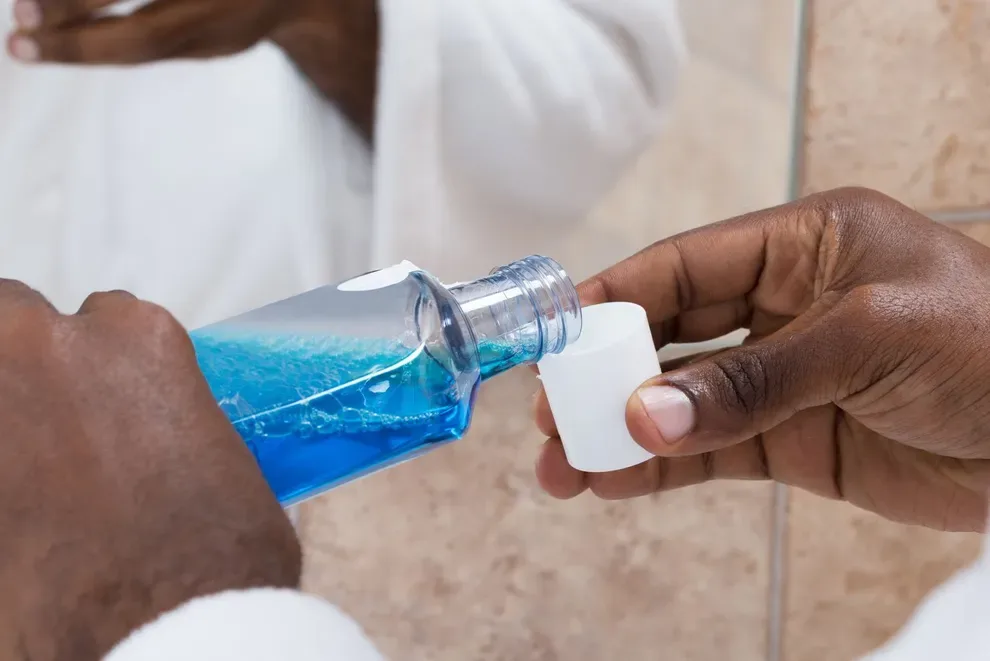Mouthwash for a Receding Gumline - How Much Does It Help?

Table of Contents
- What Are The Top Brands
- How Effective is Mouthwash
- Best Mouthwash for Receding Gums
- DIY Mouthwash for Receding Gums
- Other Treatment Options
- References
Mouthwash doesn’t address the underlying causes of receding gums, but it does stop bacteria and plaque buildup, which are responsible for gum disease. Gum recession, a condition in which the margin of the gum tissue surrounding the teeth begins to wear away, often stems from various forms of gum disease and poor oral hygiene.
In addition to gum diseases, the underlying causes of receding gums often include the following:
What Are The Top Brands?
Corsodyl
Corsodyl is a well-known manufacturer of toothpaste, floss, and mouthwashes. The Corsodyl mouthwash helps with bleeding gums as well as recession, and it prevents gum disease. It is the go-to brand for many people with gum recession.Corsodyl contains an active ingredient called chlorhexidine digluconate, an antiseptic that kills bacteria that aren’t layered onto the teeth.
Listerine
Listerine is said to kill up to 97% of bacteria and has a renowned fresh, minty taste. This is a good option if you’re looking for a bit of variety since you’ll typically find several types available.
This brand makes mouthwash specifically for gum disease, which is sold in the UK — Listerine Advanced Defence Gum Treatment. Made specifically for gum problems, it removes plaque, maintains gum health, and gives you minty fresh breath.
The initial sign of gum recession is usually tooth sensitivity, or you may notice a tooth seems longer than normal.
How Effective is Mouthwash?
Corsodyl uses an antiseptic (chlorhexidine digluconate) to kill plaque and stop bacterial buildup, a measure that can stop the development of receding gums. Aside from aiding in the prevention and treatment of gum disease, the antiseptic fights oral thrush and mouth ulcers. It can also be used for partially erupted teeth (wisdom teeth especially).
Corsodyl might cause temporary brown stains around your gum line and a tingling sensation on your tongue and cheeks. It can also be deactivated by sodium lauryl sulfate, an ingredient found in some toothpaste. For maximum effectiveness, your dentist may recommend another toothpaste or advise you not to brush your teeth for at least 30 minutes after using Corsodyl.
Listerine no longer includes its customary essential oil formula in its mouthwash. Instead, the brand’s gum treatment mouthwash has an ingredient called Ethyl Lauroyl Arginate HC, an antimicrobial that’s been used to stop plaque buildup in packaged foods for years.
Listerine stops plaque buildup, thereby preventing the tooth irritation that leads to gum recession. However, it also contains alcohol, and so it might cause an unpleasant burning sensation that lasts temporarily.
Listerine is said to be effective in as little as two weeks when used twice a day. However, neither it nor Corsodyl should be used in lieu of mechanical brushing since they mostly kill the bacteria floating around your mouth and not the ones embedded on the surface of your teeth.
The best recommendation is to seek professional advice from a dentist or oral hygienist first. Neither of these mouthwashes addresses the underlying cause of your receding gums. They are only meant to serve as supplementary aids for gum recession, which must be established by a health professional first.
What Is The Best Mouthwash for Receding Gums?
While all mouthwashes with antimicrobial and antiseptic properties will help reduce bacteria and plaque in the mouth to promote oral and gum health, some products are formulated specifically to treat gums and may help with issues like receding gums.
Top mouthwashes for gums include the following:
DIY Mouthwash for Receding Gums
If you prefer the natural or do-it-yourself route, there are plenty of safe mouthwash recipes to make at home.
The most basic recipes use distilled water, baking soda, and sea salt and/or essential oils (often peppermint or tea tree oil, which have antimicrobial properties).
Baking soda is antibacterial and can bring relief to tender gums. It also can help in reducing inflammation in the mouth.
Talk to your dentist before trying any new rinses and be wary of any recipes that call for alcohol in the ingredients. While alcohol is used in many over-the-counter mouthwashes, it can cause dry mouth, which can actually harm the gums and encourage plaque and bacteria.
Some variations of DIY mouthwash recipes include the following:
Calendula extract, peppermint leaf or sage tea, and white oak bark extract
Aloe vera and/or xylitol
Apple cider vinegar or rosemary
